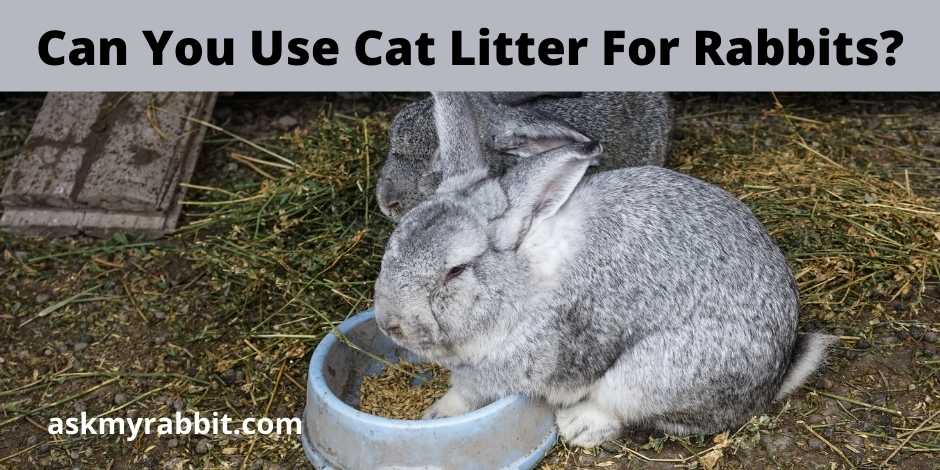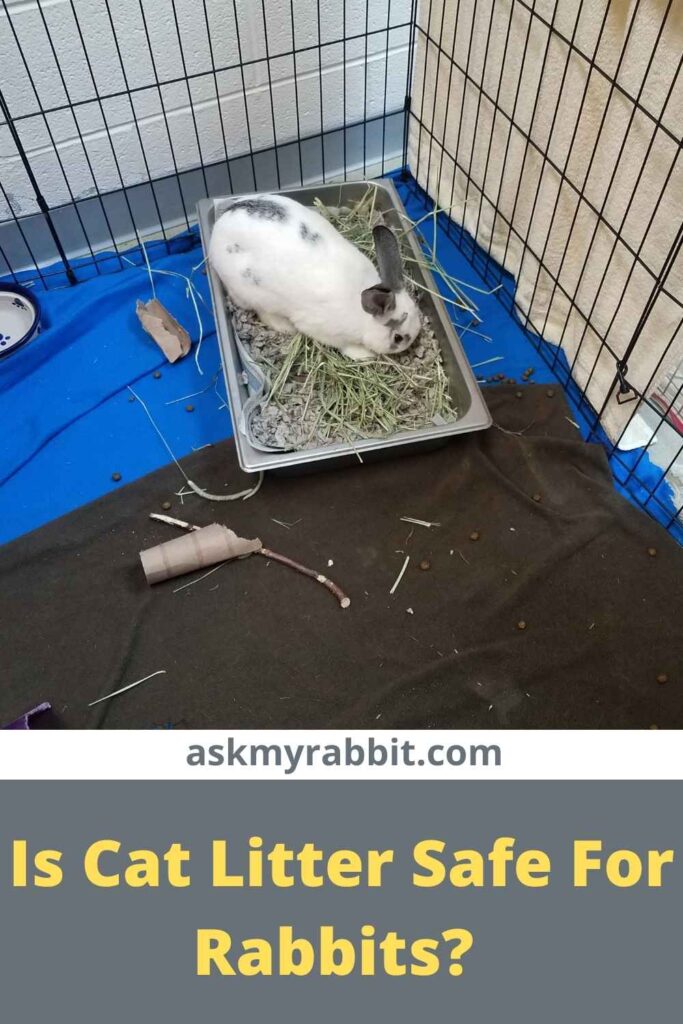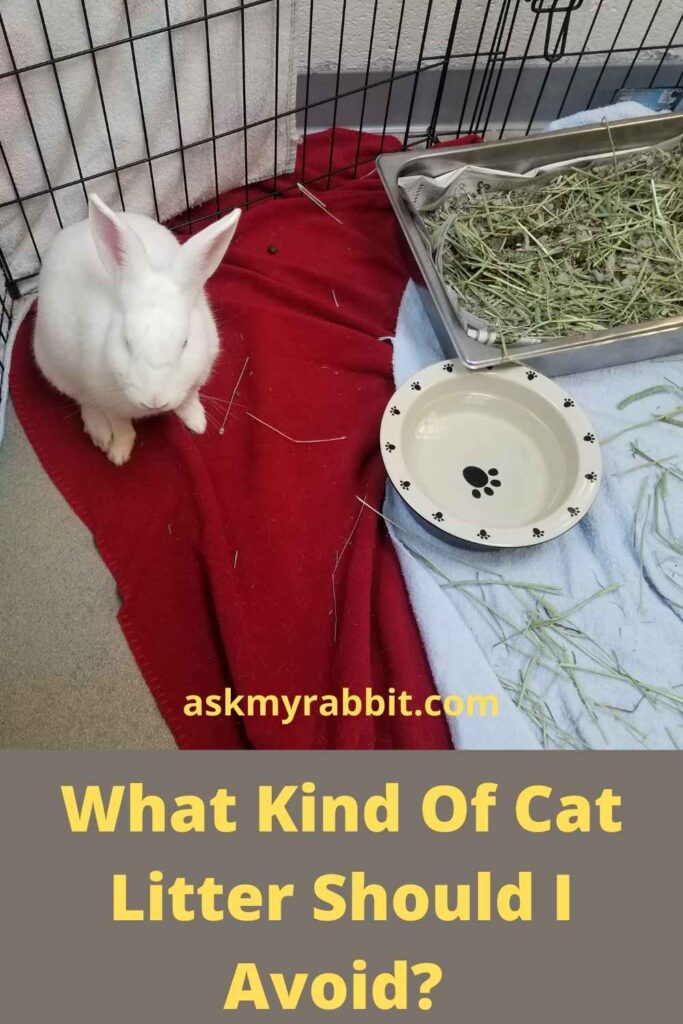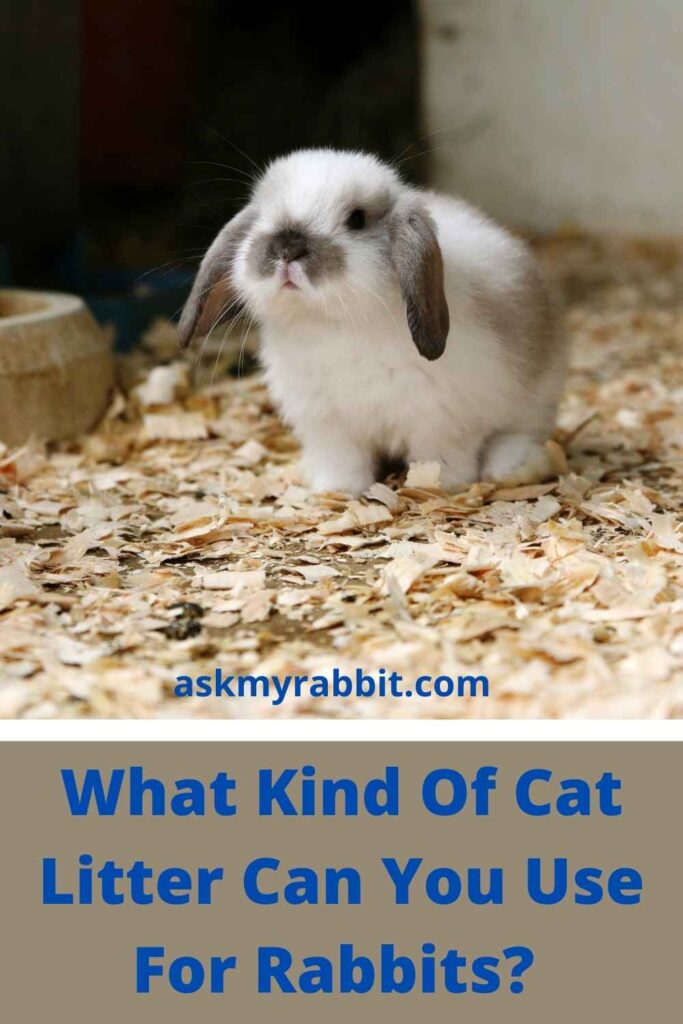If you are a pet parent with both cats and bunnies, you may wonder if you can use cat litter to line your rabbit’s litter box.
No, you should not use cat litter for rabbits. Rabbits are poisoned by most cat litters. Clumping, crystal, and clay litters can cause intestinal issues in rabbits.
Some cat litters, on the other hand, are composed of rabbit-friendly materials. Paper and natural wood are among the materials used.
Owners may find cat litter to be a convenient option. There are, however, items that can be used as rabbit litter. Newspaper shavings, compressed wood shavings, and hay are some alternatives to cat litter.
In this article we will inform you all about the use of cat litter for your bunny. So, keep reading!

Is Cat Litter Safe For Rabbits?

No, cat litter is not safe for bunnies. Rabbits can be harmed by cat litter. While certain varieties of cat litter are okay for rabbits, the majority should be avoided.
The following are some of the most typical negative effects of using unsuitable cat litter on rabbits:
1. Blockages In The Intestines
Rabbits consume litter at a higher rate than cats. While cats do occasionally consume their own litter, this is seen as a behavioural problem. However, consuming litter is a frequent and normal behaviour in rabbits.
Cat litter is made with the possibility of ingestion in mind. Rabbits are at risk of eating cat litter when they use it. When swallowed, most cat litters cause stomach difficulties and can even result in death.
Rabbits are constantly at danger of intestinal obstructions when using cat litter that contains silica or clay.
2. Issues With The Lungs
Another point to consider is respiratory problems. Rabbits’ respiratory systems are more sensitive than cats’.
Cat litter can include a lot of dust particles, such as clay and crystal particles. This dust can cause respiratory problems in rabbits if they inhale it.
3. Digestive Issues
Rabbits are susceptible to digestive disorders in addition to intestinal obstructions. While digestive issues are minimal in comparison to obstructions, they nonetheless put a rabbit’s health at danger.
What Happens If A Rabbit Eats Cat Litter?
Rabbits should not be given cat litter since they prefer to gnaw and chew everything in their hutch. Their litter is included in this.
If cat litter is eaten or nibbled by a rabbit, it will expand and become trapped in their throats or stomachs. This may cause diseases. A specially developed rabbit litter is a safer solution.
Looking for litters that are specifically for rabbits is a safer option. Some of the greatest rabbit litters on the market include paper pellet litter and aspen wood shaving litter.
What Kind Of Cat Litter Should I Avoid?

Most cat litters are toxic to rabbits. However, there are a few exceptions. Here are a few cat litter to stay away from:
1. Clumping
Rabbits are poisoned by all varieties of clumping cat litter. In fact, it’s one of the riskiest types of litter for your rabbit. When wet, clumping litter may grow up to fifteen times its original size.
Clumping litter expands in the stomach after being consumed. This will, at best, result in clogs. In the worst-case scenario, your rabbit’s digestive tract will shut down completely.
2. Clay
Clay litter, while not as hazardous as clumping litter, is nevertheless dangerous when consumed. Digestive problems, as well as obstructions, can be caused by clay litter.
Even if your rabbit does not consume the clay, the litter’s particles might be dangerous. When breathed in, clay litter can cause respiratory problems.
3. Crystal
While crystal cat litter is frequently thought to be a safer option to other forms of cat litter, it can be detrimental to rabbits. Crystal cat litter is the most easily eaten of all the cat litters.
Crystal cat litter also contains ingredients to maintain its crystalline state. When rabbits eat certain formulations, they can become poisonous.
What Kind Of Cat Litter Can You Use For Rabbits?

Most cat litters are not rabbit-safe. However, there are a few cat litters that you can safely use for your bunny:
1. Paper
Paper pellets are one of the most popular rabbit litters. Paper is non-toxic, chemical-free, and biodegradable by nature.
Paper is also incredibly absorbent. This makes it an excellent and safe substitute for other forms of cat litter. It is also safe to eat because it is readily digested by both cats and rabbits.
Paper pellets are both non-toxic and chemical-free. They are manufactured from recycled paper. They’re both biodegradable as well.
2. Wood Fibers
Natural wood fibers are the most prevalent materials for rabbit litter for a reason. Wood fibers absorb moisture and are generally safe for rabbits to eat.
They are biodegradable, much as paper. Furthermore, certain woods emit a pleasant odor that both you and your rabbit will like.
Pine and cedar are the most frequent woods used in cat litter. Both of these woods are fragrant and can hide the odor of urine. However, it is less effective than litters that are intended to absorb odors and pee.
It should be mentioned that some rabbit owners are apprehensive about using wood as litter. Wood is said to be a cause of liver illness.
This is based on how softwoods are avoided in the laboratory because to their effect on the liver. Wood fibers, on the other hand, are less efficient in absorption than paper.
Wood shavings are also more abrasive to a rabbit’s feet. There are still other options to pick from if you are concerned about utilising wood shavings. This is owing to concerns of liver illness or ineffectiveness.
Can You Use Non Clumping Cat Litter For Rabbits?
Yes, you can use non clumping cat litter for rabbits. Some cat litters are not just acceptable, but ideal, as rabbit bedding. For example, a bedding product made from recycled newspaper, safely and sustainably aborbs odor and moisture.
Non-clumping alfalfa, wheat, oat bedding and litter are also appropriate. You may use these ‘cat litters’ as an alternative for your bunny friend.
Many clay litters have a high dust content. Your bunny may kick significant volumes of fine particulate debris into the air if he digs.
When this gets into his lungs, it may create a lot of inflammation. This can lead to coughing, bronchitis, and even pneumonia. Long-term exposure to gritty clay litters can cause life-threatening respiratory harm to your rabbit.
Can You Use Wood Pellet Cat Litter For Rabbits?
No, you should not use wood pellet cat litter for rabbits. The verdict on whether pine and cedar litters are detrimental to rabbits is yet out.
We do know that rabbits exposed to these potentially toxic tree oils commonly have raised liver enzymes. This may render them more susceptible to anesthesia’s effects.
However, heat processing of wood-based cat litter pellets eliminates the toxic oils and phenols. This ensures that there is no risk of skin and lung irritation.
These pellets should be used with a straw covering for warmth and comfort in the sleeping regions of outdoor rabbits. If the brand includes silicon as an ingredient, it should be avoided.
If there are any feasible alternatives, avoid using cat litter and bedding material manufactured from these trees.
How Do I Swap Out My Rabbit’s Litter?
Litter is familiar to rabbits in terms of sight, smell, and feel. Changing the sort of litter you use might cause a rabbit to get confused or refuse to use the box. Simply switching from one type of litter to another will not work for most rabbits.
To swap out one sort of litter to another, follow these steps:
- Instead of replacing the entire litter, start small. On top of the old litter, sprinkle a layer of new litter. You don’t need to cover the old litter.
- You’ll want some of the fragrance to seep through. In particular, you’ll want to replace roughly ten percent of the old trash with fresh stuff.
- Increase the amount of fresh litter in the litter box the next time you clean it out. Substitute around ten percent more of the old for the new. After each cleaning, swap out more.
- Observe your rabbit during the transition to see if he or she enjoys the change. Rabbits have distinct personalities and tastes.
- Some rabbits may be put off by the new substance. Remove the new litter if you find your rabbit using its litter box less without any signs of change.
It can take a long time to choose a litter, set up a litter box, and switch out one material for another. However, regardless of how long it takes, you can be certain that your rabbit is comfortable, protected, and content.
Frequently Asked Questions
How Do You Keep Rabbits Out Of Cat Litter?
Bunnies may be deterred from entering the box by the overwhelming odor of litter. Pine and cedar shavings, as well as clay cat litter, should be avoided.
Why Do Rabbits Lay In Their Poop?
Rabbits lay in their poop in order to feel relaxed. This way, they can unwind in a spot where it’s safe to pee/poop. In a sense, your bunny owns the litter box. They don’t have to constantly watch themselves or fear being judged.
How Do You Reward A Rabbit?
Food, petting, housing, companions, or access to favored areas are some of ways you can reward your bunny.
Final Words
As you can see, there is a cat litter or two available for rabbits to utilize. Litters developed specifically for rabbits, on the other hand, are still the best option. Aspen wood shavings, paper pellets, and other similar materials are examples.
However, there are many more cat litters that might be harmful to your rabbit. Clay litter, crystal litter, and clumping litter pose the most danger to rabbits.
If you start litter-training a spayed or neutered rabbit the first time you bring them home, it will be okay. Otherwise, they will rapidly develop the habit of roaming everywhere, which would be difficult to eradicate.
Confine your bun and train them to use a litter box that is free of toxins and allergens. You should also be aware that clay or silica litter is extremely harmful since it can induce intestinal obstruction.
Eating clay or silica often results in death as a direct effect. As a result, you should keep this sort of litter out of your bunny’s cage.
Drop down your doubts and queries regarding your fluffy bunny’s lifestyle in the comment section below. We will answer them soon!







